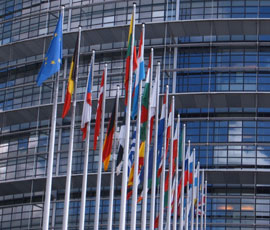Financial crisis may delay CAP reform, warns MEP

Plans to reform the Common Agricultural Policy should not be agreed until the European Union has found its way out of its financial crisis and approved its next round of budgets, MEPs have claimed.
Speaking at a debate on shaping EU farm policy and reducing agricultural bureaucracy, Euro MPs expressed concerns over agreeing how much farmers should be paid while Europe’s finances were in turmoil.
Italian MEP Giovani La Via said plans for the so-called greening of Pillar 1 – which require at least 7% of farmland being put into environmental measures in order to qualify for the full single farm payment – should not be finalised until the EU’s Multiannual Financial Framework had been debated.
“We have got to look at our stance on CAP reform,” he told the meeting of European farm ministers, the European Parliament’s Agriculture Committee and the European Commission in Brussels on Monday (7 November).
“If we are going to make a success of it we need to know how much money is going to be there. Deciding the MFF and forming the proposal of the CAP should be in tandem.”
Signore La Via said while the EU had set a timescale of 1 January 2014 for CAP reform, it was recognised across Europe that it would take longer, especially as the MFF did not have to be agreed until 2014.
“We can’t put the rules in place until we know what we are talking about,” he added.
German MEP Albert Dess also expressed concerns over the CAP reform plans at the meeting, which was the first time farm policy reform had been discussed in one room by the two co-deciding bodies.
He said the plans could leave EU farmers with less money but more bureaucracy that they currently.
“Sometimes the proposals have not taken into account the diversity of farms in Europe,” he added.
However Herr Dess said it was important MEPs came up with workable alternatives for the areas of reform they did not agree with.
“We can help knock these proposals into shape,” he said.
Farm Commissioner Dacian Ciolos agreed some elements of the reform seemed complicated, but he said the Commission needed to ensure public money was properly utilised.
“The most straightforward thing might be to dish out the CAP directly to farmers, but it’s only right that the parliament is accountable to the public as it is using their money,” he said.
“The proposals are balanced and address themselves to 27 member states. We have looked at how they apply to the real world and their potential effects.
“We must now decide on the technical instruments that will be simple but produce effects.”
Visit our special report on CAP reform
Have your say on CAP reform
